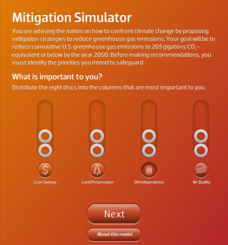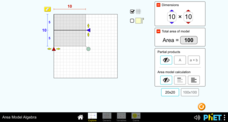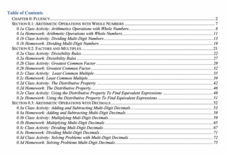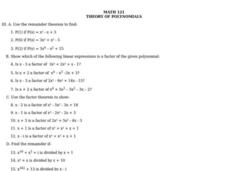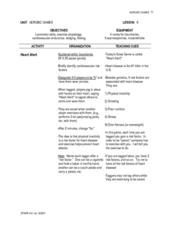Balanced Assessment
Scale Charts
Develop scales using tables. Pupils complete charts to show equivalent scale factors before using the completed tables to determine the sizes of scale drawings. They finish the lesson and demonstrate their understanding by completing a...
EngageNY
End-of-Module Assessment Task: Grade 7 Mathematics Module 4
Asses the class to determine their knowledge of proportional relationships involving percents. Class members work through the nine-question assessment with a variety of percent problems. The multi-step problems involve simple interest,...
Teach Engineering
Scale Model Project
Try your hand at scale models. Scholars create a scale model of an object using a scale factor of their choice. As part of the project, they give presentations on their processes and calculations. This is the last installment of the...
CK-12 Foundation
Conversion between Degrees and Radians: Clock Angles and Measures
It's 3:30, what radian is it? Pupils create clock angles on a clock and determine the radian measure to the minute hand. They then use a conversion factor to convert from one measurement to another.
CK-12 Foundation
Six Trigonometric Functions and Radians: Degrees to Radians and Back Again!
How do degrees relate to radians? The interactive allows pupils to manipulate the size of an angle in a unit circle to help see that relationship. Users determine the radian measure for given degree measures of angles, realizing the...
National Academy of Sciences
Mitigation Simulator
The United States has more per capita emissions than any other country in the world. An eye-opening simulation encourages users to explore environmental goals and factors that affect climate change by balancing different priorities....
Chemistry Collective
Virtual Lab: Determination of the pH Scale by the Method of Successive Dilutions
Where did the pH scale come from? Take a deeper look at a most important measure of ion concentration using a simulated physical determination. Young chemists prepare a series of dilutions after determining a dilution factor for the...
Corbett Maths
Enlargements Using Ray Method
Figure out what to do when there is no grid to count. Using a ruler and a sharp pencil, the narrator shows how to perform a dilation when the figure is not on a grid. The ray method works by drawing a ray from the center of dilation...
College Board
2001 AP® Environmental Science Free-Response Questions
Water quality testing often reveals interesting facts about the local environment. Scholars respond to several AP® questions highlighting topics such as air pollution, water pollution, and the spread of disease. Each question requires a...
College Board
2004 AP® Macroeconomics Free-Response Questions Form B
A problem set explores how an international crisis could affect the economic health of Canada using authentic materials from College Board. Other questions ask learners to create and evaluate supply and demand curves and examine factors...
College Board
1999 AP® Microeconomics Free-Response Questions
Imports often affect the production of domestic goods. Scholars consider the variables in this situation with a scaffolded prompt from College Board. Other items examine factors in production and compare the production advantage between...
University of Richmond
The Overland Trails 1840-1860
What led Americans to head west in the 1800s? Using an interactive map and journals from those who traveled, pupils explore the stories of those who migrated. In addition, they see how the numbers fluctuated in response to the push-pull...
University of Texas
Understanding Migration
Human migration—often the result of push and pull factors—sometimes has dramatic outcomes for both those leaving their homelands and the host countries. Using a variety of case studies, learners consider those issues. Then, by completing...
PHET
Arithmetic
Three interactives times three difficulty levels equals nine possible games. Scholars play a online game that requires finding products, determining missing factors, and finding quotients. Multiplication tables are available to help...
PHET
Area Model Algebra
Expand the pupils knowledge of using area models to algebra. The interactive allows learners to use the same procedure of getting partial products when multiplying multi-digit numbers to multiplying polynomials. Scholars see how the...
PHET
Area Model Decimals
Area works with decimals too. Pupils use the interactive to model multiplication of two decimals using an area model. They see how the decomposed components of the factors obtain partial products and then the complete product. Using area...
Radford University
Kite Project
Let the class' knowledge of geometry soar like the kites they create. After researching the history and science of kites, learners draw up a blueprint for their own kites. They then calculate the areas and perimeters based on the scale...
University of Florida
Six Bits of Abiotics
Collect clues and unwrap a mystery in an intriguing study about air pollution and urban forests. Teams share information to explore abiotic interactions and forest health. Scholars create a concept map using newly acquired knowledge and...
Utah Education Network (UEN)
Fluency
Become fluent in the language of mathematics. Scholars learn to divide multi-digit whole numbers as well as see how to determine the greatest common factor and least common multiple. They also investigate how to apply the distributive...
Flipped Math
Sketching Polynomial Functions
Provide a sketch of the suspect. Scholars see how to use the key aspects they know about polynomials to create a sketch of the graph. Learners factor to calculate the zeros by factoring, find the end behavior, and determine the...
Flipped Math
Similar Figures
Use some similar problems to find side lengths. Pupils learn the definition of similar figures and how it relates to corresponding angles and sides. Using the definition, individuals calculate the lengths of missing sides and practice...
Curated OER
Theory of Polynomials
In this polynomial worksheet provides extra practice the Factor and Remainder Theorems. They identify factors of given linear expressions. This two-page worksheet contains 19 problems. The answers are provided on the second page.
Curated OER
Factoring Polynomials
Young mathematicians examine the "Tic-tac-toe" factoring method to factor polynomials. They use algebra tiles to model solutions of binomial multiplication problems. They discuss strategies and observe teacher-made models for solving...
Curated OER
Heart Alert
Explore some of the causes and preventions of heart disease. Young learners play a game of tag in which the taggers role play as risk factors for heart disease. Players who are tagged call out "heart alert" and are saved when someone...
Other popular searches
- Common Factors
- Factors of Production
- Biotic
- Factors and Multiples
- Abiotic and Biotic Factors
- Abiotic
- Factors That Affect Climate
- Abiotic Factors
- Limiting Factors
- Biotic Factors
- Greatest Common Factors
- Conversion Factors







